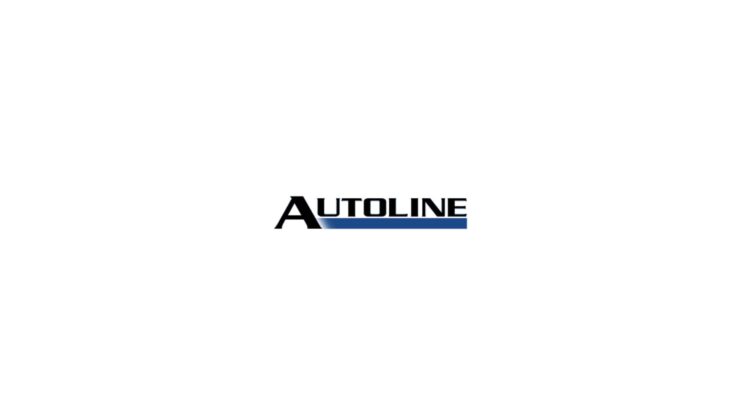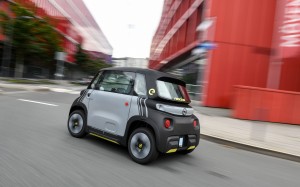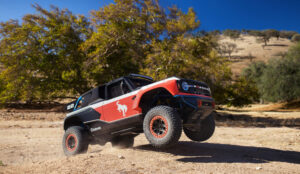
Listen to “AD #3195 – Car Prices Won't Come Down; Telsa Opens Superhargers to Others; Ford to Sell Extreme Off-Road Broncos” on Spreaker.
Follow us on social media:
Runtime: 11:06
0:08 Chip Shortage Hurting Global Economy
1:00 Car Prices Won’t Come Down
2:07 Tesla Opens Supercharger Network to Others
3:19 Tesla FSD Recall
3:45 Elon Musk Puts Pressure on Hertz
4:48 Opel Sets Pricing for Mini Rocks-e
5:35 Multimatic Makes Hardcore Bronco for Ford
6:29 GM Expects Upside Sales Surprise
8:36 You Said It!
Visit our sponsors to thank them for their support of Autoline Daily: Bridgestone, Intrepid Control Systems, Magna and Schaeffler.
This is Autoline Daily, the show dedicated to enthusiasts of the global automotive industry.
CHIP SHORTAGE HURTING GLOBAL ECONOMY
The chip shortage that is crippling car production is starting to drag down other parts of the global economy. In Japan, total exports were down 46% in September, which shows how important the auto industry is to Japan’s economy. In the United States, U.S. Steel is trying to unload 50,000 tons of high-grade steel that automakers can’t use. And that’s at just one of its plants. Aluminum and plastic producers have also been impacted. Backups and log jams at ports around the world caused the cost of shipping containers to skyrocket. Before COVID and the chip shortage, a container might cost around $3,000. Now it’s $30,000. The New York Times reports that the chip shortage could cause some economies to slip into a recession.
CAR PRICES WON’T COME DOWN AS CHIP SHORTAGE EASES
Will car prices go down as the chip shortage eases up? Don’t count on it. Automakers are stunned at the pricing power they now have due to tight inventory. And they will do everything they can to protect the margins they’re getting. For example, before COVID and the chip shortage, Ford typically had 75 days’ worth of inventory on its dealer’s lots. But it says it will never do that again. When production returns to normal, Ford says it will only keep 50 days of inventory. Even more, Ford is now incentivizing customers to order their cars, not buy off the lot. You can actually get a better price if you order a car. When dealers order cars, they’re kind of guessing at what will sell. But when customers order exactly what they want, there’s no guessing. That eliminates waste at the factory, reduces floor plan costs at dealerships and puts more money on the bottom line. So put it all together and that’s why the industry is never going back to having tons of inventory.
TESLA OPENS SUPERCHARGERS TO NON-TESLA OWNERS
We’ve got more info on how Tesla is opening its charging network up to other EVs. A pilot project with 10 Supercharger stations in the Netherlands will accommodate any vehicle with the Combined Charging System, or CCS, outlet. It’s what Tesla uses in Europe and so do BMW, Daimler, Ford and Volkswagen. New users will need to download the Tesla mobile app. But unlike Tesla users, it’s not plug and play and they’re going to be charged more money. Non-Tesla EV owners will have to start and stop the charging session and select the right charger in the app, instead of simply plugging in. How much will Tesla charge them? It didn’t say. But right now Tesla owners pay about 22 to 26 euro cents per kWh in the Netherlands, compared to about 18 cents for residential rates. Non-Tesla owners will be charged more but can get a discount with a membership. Tesla operates more than 25,000 Superchargers worldwide and opening them up to more users would bring in more money.
TESLA FSD RECALL
Speaking of Tesla, it’s recalling nearly 12,000 Model S, X, 3 and Ys in the U.S. And it’s all about a recent update to FSD, which could cause a false forward-collision warning or unexpected activation of the emergency brakes. Tesla temporarily went back to the last version of FSD while it works through the issue.
ELON MUSK PUTS PRESSURE ON HERTZ
And despite all the hoopla about Hertz buying 100,000 Teslas, Elon Musk says, ‘Not so fast.’ Yesterday he tweeted, “I’d like to emphasize that no contract has been signed yet.” And while it’s true that Hertz needs the Tesla deal a lot more than Tesla needs Hertz, this sure sounds like a negotiating tactic to us. No doubt Elon is trying to get Hertz to sweeten the deal.
OPEL SETS PRICING FOR MINI ROCKS-E
Remember when we told you that Opel is coming out with its own version of the all-electric Citroen Ami? The Opel version is called the Rocks-e and now we’ve got info on the pricing. Base price in Germany: 8,000 euros or roughly $9,300. That’s about a thousand euro more than the Ami. The little EV features a 5.5 kWh battery pack that returns 75 kilometers or 46 miles of range. So far the Ami hasn’t really set the market on fire. It’s on pace to sell about 5,000 units in France this year. It’s all part of the Stellantis umbrella and the car will also be sold in the U.K. and eventually the U.S.
MULTIMATIC MAKES HARD CORE BRONCO FOR FORD
Ford wants hardcore off-road enthusiasts to take the Bronco racing through the desert. It’s going to offer a limited run of Bronco DRs, which is a purpose-built vehicle to take on extreme events, like the Baja 1000. The development, build and distribution are all being handled by Multimatic, the same company that makes the Ford GT in Ontario, Canada. The frame and body structure come from a Bronco four-door and then are optimised for desert racing. Highlights include a Coyote 5.0L V8 that should produce around 400 horsepower, Spool Valve dampers from Multimatic, locking front and rear differentials and unique half-shafts. As the Bronco’s chief designer said, “It’s not just a Bronco with some stripes on it.” The Bronco DR will be available late next year.
GM EXPECTS UPSIDE SALES SURPRISE
General Motors is going to see a nice bump in revenue early next year. And it all has to do with those vehicles it could not sell because they were missing chips. In normal times automakers book a car as sold as soon as it drives off the assembly line. That’s because dealers ordered those cars and as soon as it leaves the plant, it’s theirs. In the industry those are called wholesale units, because they are wholesaled to dealers, who then turn around and retail them. But with the chip shortage, GM built thousands of vehicles that could not be wholesaled because they were not completed units. But as the chip shortage eases, GM will be able to complete those vehicles. And it expects to see a nice bump in sales and revenue early next year as they officially get booked as sold.
LYTEN ON AFTER HOURS
Have you heard of a company called Lyten? L-y-t-e-n. They’ve come up with a way to use graphene to make lithium sulfur batteries for EVs that are lighter, cheaper and have more energy density than what we’re using today. It could be a game changing technology for the automotive industry. So join us this Thursday on Autoline After Hours when we’ll have Dan Cook, the CEO of Lyten, coming on the show.
YOU SAID IT!
Toyota is running full page ads in major newspapers in the U.S. slamming that proposal that would give an extra $4,500 in subsidies to people who buy electric cars made by UAW labor. In the ad, Toyota tells Congress to “treat all American workers fairly.” Yesterday we asked you if U.S. taxpayer money should only subsidize EVs made in the USA and we got a lot of feedback on both sides of the issue.
– B Cuz says, “No to government subsidies.”
– But G V doesn’t see it that way. “Subsidize only EVs manufactured in the USA!” he says.
– Lambo2015 says, “I would prefer if they were based on % of US labor content. Equal to all manufacturers and regardless of union or not.”
– Dave Perkins says that “Taxpayer money should be used to repatriate jobs.”
– Alex Carazan doesn’t see the need for subsidies. “If politicians and corporations want EV’s to be adopted in the market in USA then the ONLY way is (the) free market.”
– Brandon Lamrock takes a more nuanced view. “The American in me says ‘only subsidize domestic EVs.’ The human in me facing a global warming extinction event says ‘who cares where they are built, stop burning oil and marching to your death.’”
– Ian Thomas points that in other countries, EV credits apply to all EVs. “In the UK, and Europe. Tax subsidies apply to Tesla cars made in the US.”
– And finally, John DiLiberto sure seems to have a Libertarian streak in him. “Subsidies, huh? I’d like to see the federal government return to the size it was in the ’90s . . . the 1790s.”
Thanks for providing your feedback, but that brings us to the end of today’s show. Thanks for making Autoline Daily a part of your day.
Thanks to our partner for embedding Autoline Daily on its website: WardsAuto.com
Seamus and Sean McElroy cover the latest news in the automotive industry for Autoline Daily.









